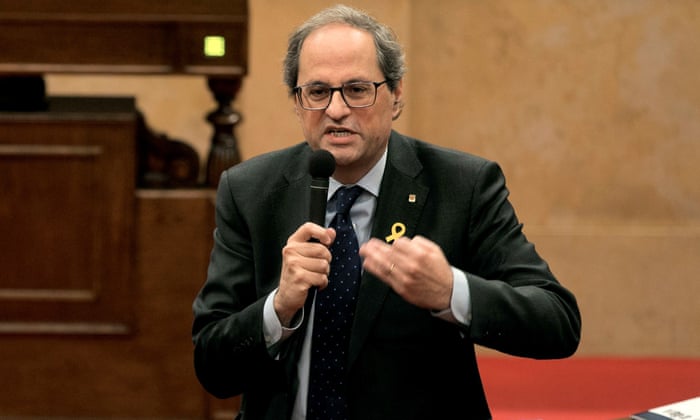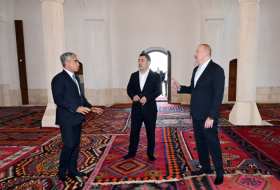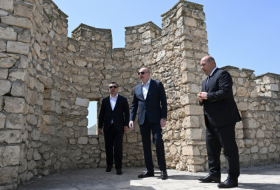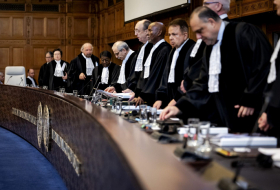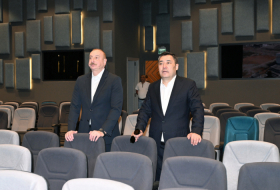Pedro Sánchez, whose Socialist administration has taken a more conciliatory approach to the independence issue than its conservative predecessor, will meet Quim Torra late on Thursday afternoon.
Sánchez and his ministers are holding a meeting in the Catalan capital the following day, a decision that has angered hardline independence campaigners.
Secessionists claim the cabinet’s choice of meeting in Barcelona, exactly a year after the vote called by the previous Spanish government, which seized control of the region following a unilateral independence referendum and subsequent independence declaration, is deliberate and provocative.
Protesters have promised a day of demonstrations against the central government’s presence in the city on Friday.
Groups of activists, whose blockades of roads and railways have previously been praised by Torra, have said they will take to the streets to “defend the right to self-determination … and to confront the oppressive state”.
A picture posted on Twitter by the Committees for the Defence of the Republic showed a burning photograph of King Felipe, accompanied by the caption: “On 21 December, we’ll be ungovernable.”
A massive police operation will aim to ensure the cabinet meeting goes ahead with minimal disruption, but senior officers will be keen to avoid any repetition of the police violence that marred the independence referendum 14 months ago.
Jordi Turull, one of the jailed Catalan leaders facing trial next year over his role in the push for independence, said the cabinet meeting should not be held in Catalonia a year after the regional election.
“Over 10% of lawmakers elected that day are in jail or in exile,” Turull told Agence France-Presse earlier this week. “To come on that day is a provocation.”
But Turull, a former regional government spokesman whose hunger strike with three colleagues ended on Thursday, warned violent protests would not help the independence cause.
“I would not like it if people, with their faces covered, demanded my freedom,” he said. “We have to do as we have always done, which is to protest peacefully.”
The first anniversary of the referendum – which was held in defiance of the central government and ruled illegal by Spain’s constitutional court – saw angry pro-independence activists blocking roads and railway lines and jostling with police outside the Catalan parliament.
Torra was widely criticised for encouraging the protesters by urging them to “keep up the pressure”.
The president, who has a history of bombastic and anti-Spanish pronouncements, came under further pressure earlier this month when he called on Catalans to emulate Slovenia’s path to independence.
Slovenia’s declaration of independence in 1991 led to a 10-day war against the Yugoslav army in which dozens of people were killed.
Torra’s exhortation prompted an angry rebuke from the Slovenian prime minister, Marjan Šarec, who said he saw “no parallels” between his country and Slovenia.
Sánchez, meanwhile, said comparisons with Slovenia or Kosovo demonstrated “a lack of historical knowledge, an unacceptable manipulation and the desperation of someone who’s run out of arguments to support his political ideas and has resorted to lies”.
The Spanish prime minister has offered to increase Catalonia’s powers of self-government but flatly refused to discuss independence, saying any negotiations must respect the constitution, which is founded on the “indissoluble unity of the Spanish nation”.
Sánchez also recently warned the Catalan government that any breach of the law would be met with a “calm but firm, proportionate and robust response”.
Torra’s push for independence, which follows that of his predecessor, Carles Puigdemont, remains deeply divisive within Catalonia. Polls suggest the region is roughly evenly split on whether to leave Spain.
While a majority of Catalans favour an independence referendum if it is jointly agreed by Madrid and Barcelona, separatist parties have never managed to take 50% of the vote in the regional parliament.
Last year, the three separatist parties won 47% of the vote and a total of 70 seats in the 135-seat regional parliament.
But the centre-right, pro-unionist Citizens party was the single biggest winner, taking 37 seats and 25% of the vote.
The Guardian
More about: Barcelona








